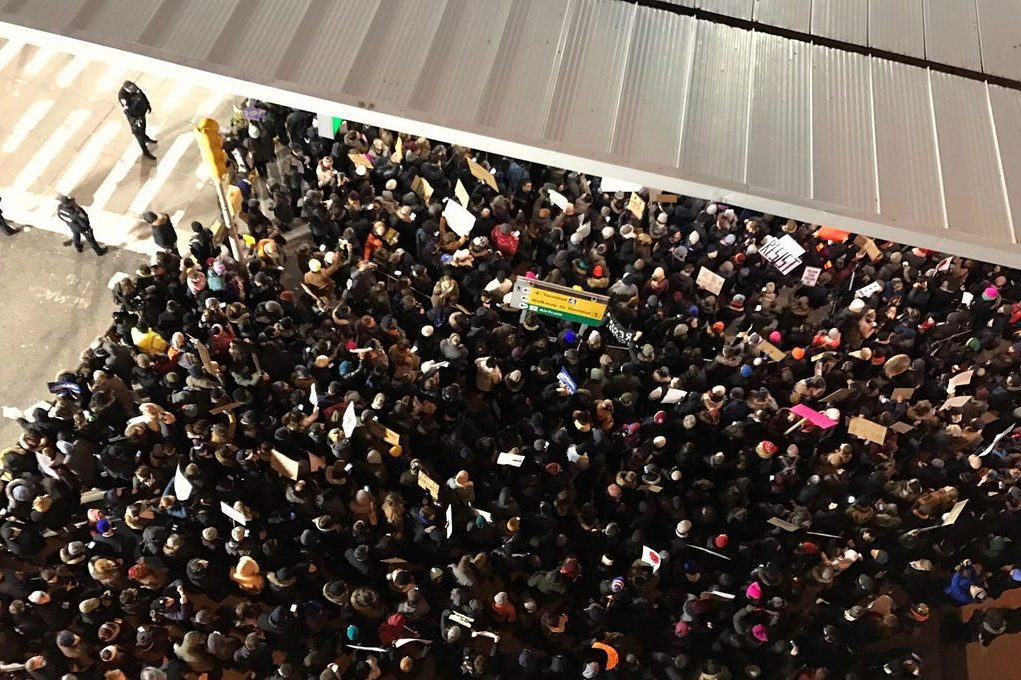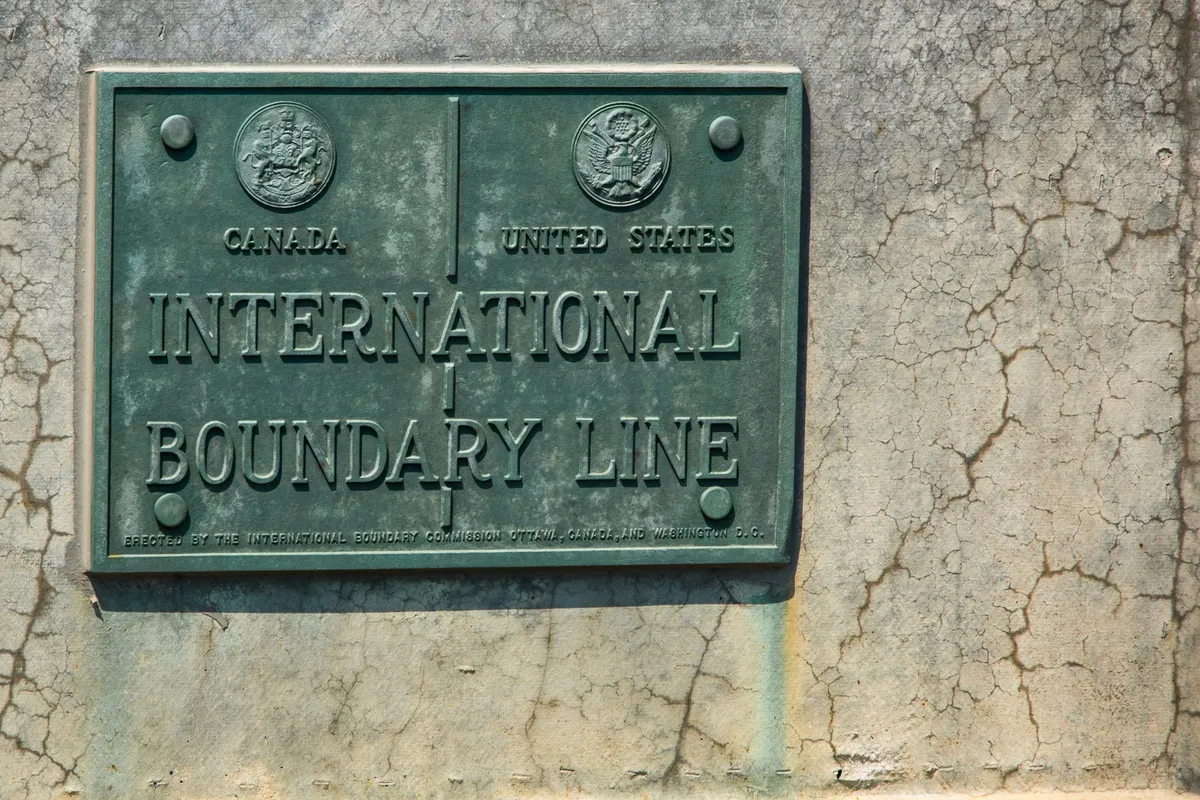Corporate Travel Got Even More Complicated in 2017

Skift Take
From a controversial U.S. travel ban to questions about the implementation of Brexit to a devastating Atlantic hurricane season, the past year required business travelers to adapt and change course, sometimes at a moment’s notice.
At the same time, global economic growth finally looks healthy a decade after the financial crisis, according to the Skift 2018 Global Travel Market Outlook. High consumer and business confidence is likely to motivate businesses to hire employees and to encourage them to travel.
Skift asked executives in corporate travel — travel management companies, technology providers, organizations, and others — what affected their business in 2017 and the biggest industry breakthroughs this year. We also asked about their priorities for 2018, which will appear in a story in the coming weeks. They responded by email and in phone interviews.
A Year of Surprises
While tropical storms and other natural disasters are to be expected every year, many executives said one of the biggest shocks in 2017 was the extraordinary hurricane activity in the Atlantic. The region recorded 17 named storms, the highest number of named hurricanes since 2005. Together, they caused an estimated $188 billion or more in damages, according to AccuWeather.
“I don’t think anyone foresaw the scope of the Atlantic hurricane season, and it caught quite a few people and companies by surprise,” said Gabe Rizzi, chief sales officer and president of Travel Leaders Corporate. Both leisure and business travelers saw their plans disrupted. The Caribbean is a popular destination for meetings and events, Rizzi noted, “and the strong hurricane season caused a domino effect for air travel.” Travel Leaders Corporate worked both to move travelers out of danger and to transport employees to affected areas to help with cleanup or to maintain business operations.
In addition, corporate travel executives had to scramble to deal with an outbreak in Madagascar of the plague, a disease from the Middle Ages that killed more than 200 people in the country from August to mid-November. “Who would have thought you needed a plan for the plague?” said Dr. Myles Druckman, senior vice president and Americas regional medical director at International SOS, a medical and travel security services firm.
Druckman said the spate of disasters also highlighted weaknesses in preparation by businesses and travel companies. “Continually, what is a bit of a surprise is that a lot of organizations have health as a major priority, yet they struggle to find good ways to implement their plans globally,” he said.
Disasters and disease weren’t the only surprises. The political disruption that emerged worldwide in 2016 continued to affect corporate travel over the past year. Brexit has weakened the pound and damaged the confidence of UK businesses. Meanwhile, President Donald Trump’s travel ban created turmoil at airports and added to geopolitical uncertainty for business travelers. In early December, the U.S. Supreme Court allowed the third version of the ban, which bars residents of six majority-Muslim countries from traveling to the United States, to take effect while legal challenges continue.
The Global Business Travel Association has run shock scenarios covering everything from an Ebola outbreak to spikes in oil prices to terror attacks, and business travel has always shown resiliency, said Michael McCormick, executive director and chief operating officer of the association. “Yet the uncertainty factor in the past year has created both an immediate impact and the potential for a negative long-term impact as well, unlike anything we have seen,” he said.
Greeley Koch, executive director of the Association of Corporate Travel Executives, said he was surprised to notice a trend of companies scaling back their financial support for educational conferences and learning opportunities. Anecdotally, more people in the corporate travel industry are using personal vacation days and their own funds to attend conferences, he said. ACTE is responding by providing more webinars and online resources to make it easier for people to learn wherever they are.
Some unexpected developments were specific to individual businesses. For Rob Greyber, president of Egencia, the biggest surprise was the departure of Dara Khosrowshahi, chief executive of parent company Expedia, to become CEO of Uber. “The best example of his leadership is the deep leadership team and resilient culture he built at Expedia,” Greyber said.
Dan Ruch, founder and chief executive of Rocketrip, which helps businesses reward employees for saving money on corporate travel, said “maybe not the biggest, but the nicest surprise this year was seeing how the industry and more organizations have become aware and proactive about promoting sustainable travel.”
The Impact
In financial terms, the uncertainty driven by the travel bans and the U.S. laptop ban that was lifted in July had the largest impact on the corporate travel industry this year, according to McCormick. In the week following the Trump administration’s initial travel ban, $185 million was lost in U.S. business travel bookings, GBTA estimated.
The association projected that those policies led to a loss of more than $1.3 billion in 2017 in overall travel-related expenditures in the United States, including hotels, food, rental cars, and shopping expenses. “Fortunately, the underlying economies in most markets here and abroad were strong enough to support this impact for the near term,” McCormick said.
Despite political and environmental challenges, many of the corporate travel executives who answered our questions pointed to growth and momentum in their own businesses. Rizzi of Travel Leaders Corporate cited a strong U.S. dollar that made international business trips a good value for companies. In 2017, Travel Leaders Corporate expanded its reach through acquisitions and partnerships in the U.S., Mexico, and Europe.
Rizzi said he also is seeing a larger focus on the responsibility of employers to keep business travelers safe. “In a year where global terrorism has dominated the headlines, duty of care needs to be a top concern of any company who has employees traveling,” he said.
Egencia’s Greyber said he has been “amazed at the resilience of business travelers” through natural disasters, acts of terrorism, and even the normal wear and tear of corporate travel. He pointed to the example of Mahshid Mazooji, a territory sales manager in the food service industry, who was stranded overnight at Charlotte Douglas International Airport when she missed her connecting flight. Instead of complaining, she created a music video of herself dancing to Lionel Richie’s “All Night Long,” appearing with airline employees, a Starbucks barista, and fellow travelers. The video has been watched on YouTube more than 2.7 million times.
“I think the video went viral because people love stories of resilience, of reacting to adversity with joy,” Greyber said. “When we reflect on our brand, our products, what we want to stand for as a company and an industry, we think about travelers like Ms. Mazooji and how we can serve them better.”
Ruch at Rocketrip said his work on motivating business travelers to make better decisions was supported by this year’s Nobel Memorial Prize in Economic Sciences, awarded to Richard H. Thaler, an economist at the University of Chicago Booth School of Business who has been a pioneer in behavioral economics. “Recognition for his work on nudge theory and proving human irrationality has provided continued validation for the incentivized behavioral change space,” Ruch said.
Corporate Travel Tech Continues to Evolve
Executives in the corporate travel industry expect the technological change they witnessed in 2017 to accelerate next year. “People are now starting to realize that the future that we’ve always talked about – whether artificial intelligence, blockchain, or alternative forms of payment – these things are closer than people realize,” said Koch, the ACTE executive director.
These developments could be a boon to business travelers, saving time and money, and even providing them with better care on the road. “What we’re seeing in the industry are a lot of new apps for health,” said Druckman of International SOS. It’s becoming easier for a traveler to have a live video call with a doctor, for example. For some remote locations, there is now a televideo link between the paramedics that work for International SOS and the doctors helping to manage patients’ cases. Even the ability to text the assistance center instead of having to call every time makes travelers’ lives easier, Druckman said.
Rizzi of Travel Leaders Corporate noted a continued demand for mobile technology. Through the company’s mobile communications travel platform, agents can chat with business travelers on the road and can rebook a connecting flight before travelers even know they’ve missed it. “We’re also seeing a tremendous appetite for data intelligence and analytics as it relates to companies’ travel and travel expense data, to optimize and fine-tune their supplier agreements and traveler behaviors,” he said.
Another trend in 2017 was streamlining travel-booking processes. Rocketrip developed a method of embedding its technology within customers’ online booking tools, showing travelers the most cost-effective and rewarding options.
“After launching the integration, we’ve seen traveler engagement increase significantly,” Ruch said.
Steven Reynolds, CEO of hotel rate tracking tool Tripbam, said his company’s biggest innovations this year are a new analytics package with Tripbam’s proprietary lowest qualified rates and a new automated rebooking solution.
Outside of his own company, he highlighted itinerary management platform Traxo for its innovations in tracking reservations made outside corporate booking tools.
“Across the industry, Traxo’s ability to automatically capture direct bookings could be very significant,” he said.
A common theme was the growing ability to use big data to help business travelers make better decisions. Greyber of Egencia said the greatest driver of innovation at his business in 2017 was testing and learning at scale, using machine learning algorithms to improve computer models.
“While this is common across consumer internet companies, we’re the only major TMC doing this in a serious way,” he said. “Our test capacity is up 100 percent year-over-year and will continue to grow in 2018.”




